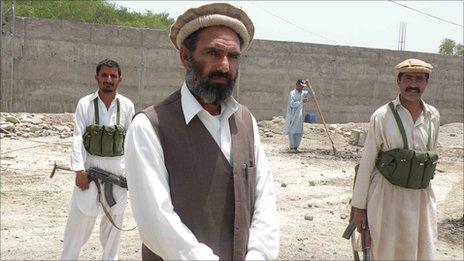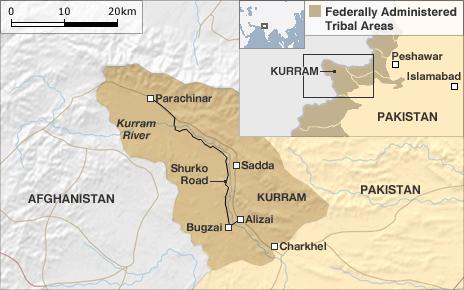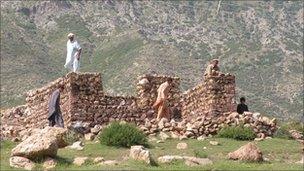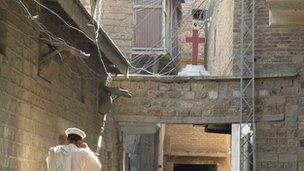The Pakistani tribe that is taking on the Taliban
- Published

The Turi community and the Taliban are bitter enemies
The BBC's M Ilyas Khan is one of the few journalists in recent months who has been able to travel to the remote north-western Pakistani tribal district of Kurram, where members of the Turi tribe are waging a war of attrition with the Taliban.
A couple of miles east of Alizai town in the Kurram tribal district, north-western Pakistan, boundary walls of two large compounds are rising fast.
Elders of the region's largest tribe, the Turi, say they are building homes for eight families from western parts of Kurram who have volunteered to resettle here.
"Apart from a house, each family will get four acres of land for agricultural use," says Haji Hashim Ali, a Turi elder and in charge of the community project.
"We hope to attract more than 200 families to this colony in a year's time," he says.
Community volunteers
The idea is to boost Turi presence in an area that belongs to the tribe but where the population has thinned out.

That has allowed others to step in and bring Taliban militants with them, Mr Ali explains.
The Turi tribe, which belongs to the Shia sect of Islam, has traditionally abhorred the Taliban - who adhere to a hardline Sunni form of the faith and many of whom consider Shias to be non-Muslims.
Two years ago, the Turis fought a major battle with the Taliban in the surroundings of Alizai.
They are now consolidating their hold on the region.
To the south of Alizai, across the Kurram river, the tribe is building a 14km (8.6 miles) road to link Alizai with the Turi stronghold of Parachinar in the west.
The Shurko road detours the Sunni-dominated town of Sadda, which is located on the region's main road that links Parachinar with Alizai and the rest of Pakistan.
In Parachinar, the district centre, and all along the Shurko road, community volunteers man checkpoints and also guard the region's airport.
There are no military checkpoints anywhere in the Turi lands from Parachinar to Alizai - and no Taliban.
To a casual observer, this comes as a surprise because Kurram is the most important strategic site from where to launch guerrilla attacks inside Afghanistan.
Its western tip is only 90km (56 miles) from the Afghan capital, Kabul.
Local people say that Taliban started pouring into the area in 2006 and set up base at a mosque in Parachinar.
"When we came to know of their presence, we took up the matter with the authorities, but they refused to expel them, saying the decisions were taken at a much higher level," says Ali Akbar Turi, another local elder.
Bombed
Fighting between the locals and the Taliban erupted in April 2007, and dozens of people were killed over the next year.

The Turi community have had to defend themselves from Taliban attacks
Devoid of local support, the Taliban were forced to retreat to their bases in Sadda and Alizai in eastern Kurram, but from there they enforced a blockade of Kurram's only road link to Pakistan.
"Our traders lost millions of dollars worth of merchandise when our trucks were bombed and burned down, and dozens of our people were beheaded," recalls Haji Hashim Ali.
In August 2008, local elders decided that if the army wasn't prepared to deal with the Taliban, it was time to raise a tribal force and storm the militant bases themselves.
Najib Hussain, a Kurram resident, fought on a front that finally led to the fall of Bugzai, a village that housed the Taliban's main base in the region, just across the river from Alizai.
"We had about 100 to 150 fighters. We would rotate them in four hourly shifts," he says.
"Fighting was intense. During the first 27 days I only came down twice from my position on the hill to take a bath. On the 27th day, I was hit and had to be carried away to the hospital."
It took the tribal force 46 days of fighting - and the loss of around 400 fighters - to inflict a final defeat on Taliban.
Nearly two years after the war, this entire area remains free of Taliban.
'Trapped'
But further east, the Taliban continue to block their exit route.

Kurram is one of the few tribal districts in Pakistan where the Christian population lives in peace
People can only leave Kurram in convoys, and only when the government provides security. Even then, they are regularly attacked.
In the last attack in July, suspected Taliban gunmen killed 18 people travelling in a passenger van from Parachinar to Peshawar, the regional capital.
Syed Abid Jan, 75, was one of four survivors.
"We started in the convoy but our van fell behind," he says.
"In Charkhel area, some 20km (12.4 miles) east of Alizai, about 10 gunmen fired at the van, causing it to overturn. Then they came closer and fired at the passengers trapped inside from all sides."
Mr Jan was hit in the back.
"When they went away, I looked around. My grandson was dead. He had fallen on me. I had fallen on my wife. She was also dead."
After three years of road blockades, the intensity of war has left a mark on the people of Kurram.
Trading and development work have come to a halt, much of the infrastructure of health, education and agriculture has been destroyed, and there is of course the emotional toll.
"A friend of mine told me to beware of going mad. I think that warning has kept me from going mad entirely," says Aqeel Hussain, the owner of a petrol station in Alizai.
"But sometimes I think I'm half mad. My blood pressure shoots up sometimes. It never used to happen before."
After the fall of Bugzai, the Taliban twice offered to guarantee the safety of the road from Kurram to Peshawar in return for access for their militants through Kurram into Afghanistan.
But this is an offer which the people of Kurram say they are determined never to accept.
- Published5 October 2010
- Published5 October 2010